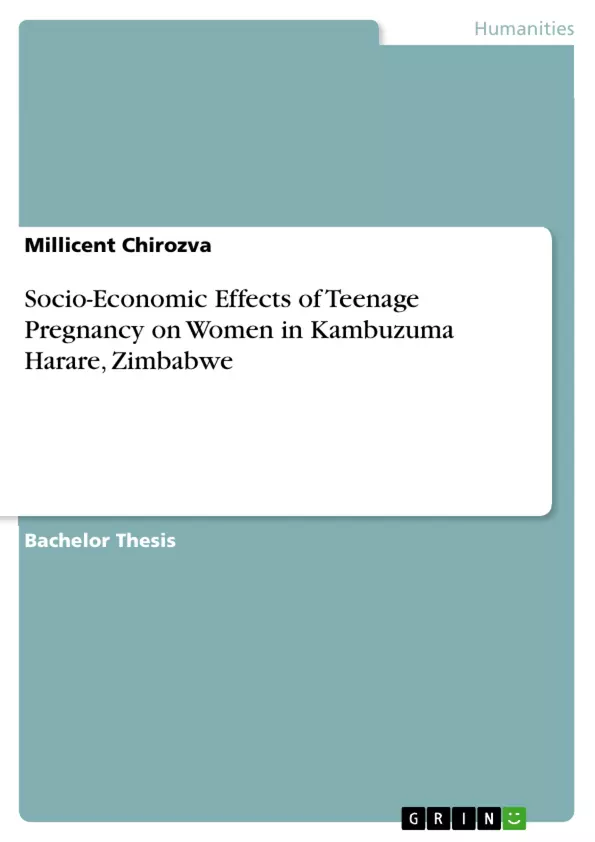The purpose of the study was to explore the socio-economic effects of teenage pregnancy among women within Kambuzuma. “Teenage pregnancy” refers to intentional or unintentional pregnancy of adolescent girls aged 13 to 19. The researcher used a structured questionnaire as a technique tool to find out the short term and long-term effects of teenage pregnancy. Methodology employed followed quantitative and qualitative design; and snowballing sampling method was used to target participants who got pregnant during their teenage years. Ethical consideration included obtaining informed consent and observing confidentiality during the research. Bourdieu’s theoretical framework of Field and Habitus, was used as the guiding the framework to explore the determinants of teenage pregnancy as well as the short term and long term socio-economic, and psychological, outcomes. Statistical analyses relied on the concepts of correlation, covariance, and cumulative frequencies which are in-built in Microsoft Excel spreadsheets as well as any decent statistical software package. Using Bourdieu’s theoretical framework of Field and Habitus allows tailoring of quantitative and qualitative research methodologies to the question at hand. Statistical results confirm postulations in literature that teenage pregnancy is associated with social and economic costs, in the short and long term, including reduced employment opportunity, income outcomes, social status, peer bonding, partner bonding, family support, truncated educational achievement, family rejection, and psychological pressures. The results suggest that adverse long term effects are more pronounced than the short-term outcomes.
Table of Contents
- CHAPTER ONE: INTRODUCTION
- 1.1 Background to the Study
- 1.2 Statement of the Problem
- 1.3 Objectives of the Study
- 1.4 Research Questions
- 1.5 Significance of the Study
- 1.6 Scope of the Study
- 1.7 Limitations of the Study
- CHAPTER TWO: LITERATURE REVIEW
- 2.1 Teenage Pregnancy: Definitions, Trends and Patterns
- 2.2 Theories of Teenage Pregnancy
- 2.3 Socio-economic Impacts of Teenage Pregnancy
- 2.4 Psychological Impacts of Teenage Pregnancy
- 2.5 Policy Interventions on Teenage Pregnancy
- CHAPTER THREE: RESEARCH METHODOLOGY
- 3.1 Research Design
- 3.2 Target Population
- 3.3 Sampling Method
- 3.4 Data Collection Method
- 3.5 Data Analysis Method
- 3.6 Ethical Considerations
- CHAPTER FOUR: DATA PRESENTATION AND ANALYSIS
- 4.1 Demographic Characteristics of the Respondents
- 4.2 Socio-economic Impacts of Teenage Pregnancy
- 4.3 Psychological Impacts of Teenage Pregnancy
- CHAPTER FIVE: DISCUSSION OF FINDINGS
- 5.1 Socio-economic Impacts of Teenage Pregnancy
- 5.2 Psychological Impacts of Teenage Pregnancy
- 5.3 Policy Implications
Objectives and Key Themes
This research project explores the socio-economic effects of teenage pregnancy on women in Kambuzuma, Harare. The study aims to understand the short-term and long-term impacts of teenage pregnancy on these women. It utilizes quantitative and qualitative methods to analyze the experiences of women who became pregnant during their teenage years.
- Socio-economic effects of teenage pregnancy
- Psychological impacts of teenage pregnancy
- Determinants of teenage pregnancy
- Policy interventions on teenage pregnancy
- The role of social and cultural factors in shaping the experiences of teenage mothers
Chapter Summaries
Chapter 1 provides an overview of the research topic, including the background, statement of the problem, objectives, research questions, significance, scope, and limitations. Chapter 2 presents a comprehensive literature review on teenage pregnancy, exploring its definitions, trends, patterns, theories, socio-economic and psychological impacts, and policy interventions. Chapter 3 outlines the research methodology, including the research design, target population, sampling method, data collection method, data analysis method, and ethical considerations. Chapter 4 presents and analyzes the data collected through questionnaires and interviews, focusing on the demographic characteristics of the respondents and the socio-economic and psychological impacts of teenage pregnancy. Chapter 5 discusses the findings in detail, highlighting the relationship between teenage pregnancy and various socio-economic and psychological factors. The chapter also explores the policy implications of the study's findings.
Keywords
This study focuses on the socio-economic effects of teenage pregnancy, exploring key concepts such as employment opportunity, income outcomes, social status, peer bonding, partner bonding, family support, educational achievement, family rejection, and psychological pressures. It utilizes the theoretical framework of Field and Habitus by Bourdieu to analyze the determinants of teenage pregnancy and its short-term and long-term outcomes. The research methodology encompasses quantitative and qualitative data collection and analysis, employing statistical concepts such as correlation, covariance, and cumulative frequencies.
- Citar trabajo
- Millicent Chirozva (Autor), 2014, Socio-Economic Effects of Teenage Pregnancy on Women in Kambuzuma Harare, Zimbabwe, Múnich, GRIN Verlag, https://www.grin.com/document/990651



